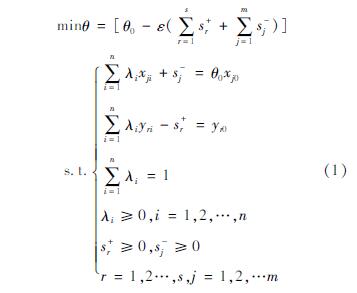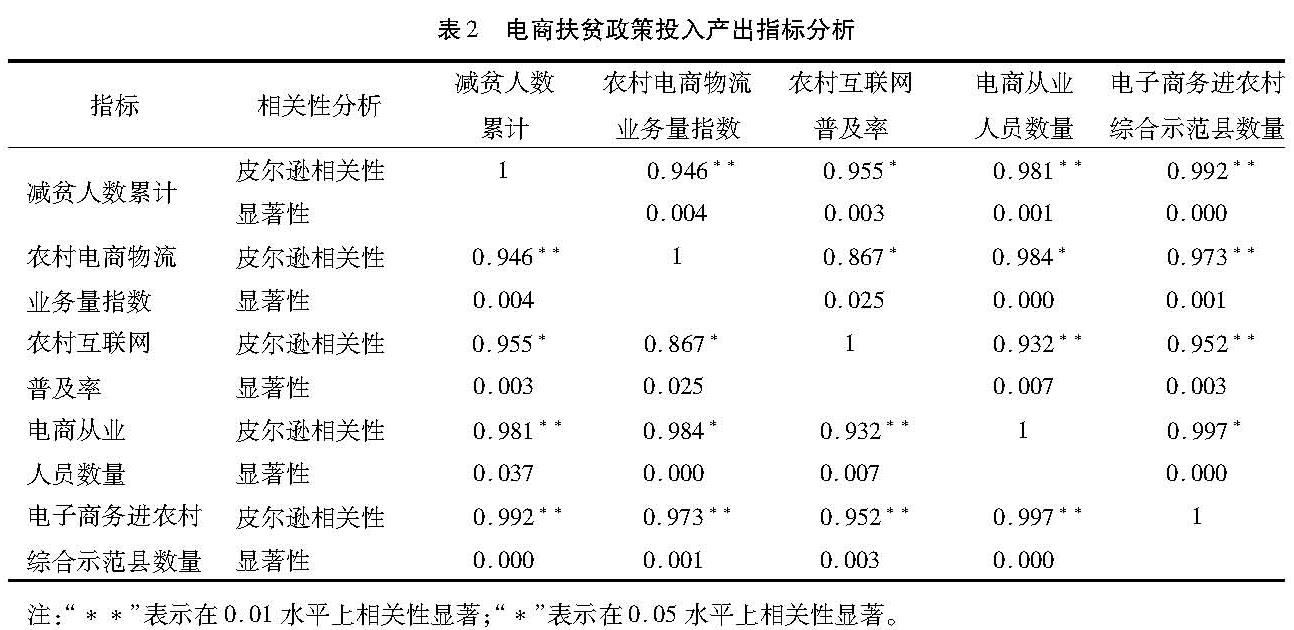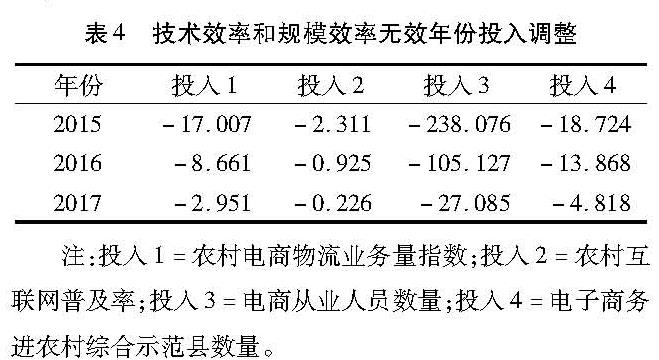4.1.1 研究方法
数据包络分析(data envelopment analysis),简称DEA,是最常用的一种非参数前沿效率分析法。其优点是可以避免人为主观因素对结果造成影响,不需要具体的参数估计和生产函数拟定,且过程简洁。DEA方法最基本的两个模型为规模报酬不变模型(CCR)和规模报酬可变模型(BCC),其中BCC模型中增加了约束条件∑ni=1λi=1。由于不同年份的社会经济、人口因素等具有差异,本文选用BCC模型。假设有n个决策单元,DMUi(i=1,2…,n)代表单个决策单元,每个决策单元有m种投入要素xji(j=1,2,…,m),r种产出要素yri(r=1,2,…,s),则针对某个特定的决策单元,判断其是否有效的BCC模型可以表示为公式(1)。

式中,θ表示决策单元的综合技术效率值,θ0为各投入要素中最易减少的比例,λj为权重系数,S+r和S-j为松弛变量。如果θ=1,同时S+r=0,S-j=0,则决策单元为有效;θ≠1,则决策单元为弱有效。

式中,k表示规模效益。若k<1,则该决策单元规模效益递增; 若k=1,则该决策单元规模效益不变; 若k>1,则该决策单元规模效益递减[11]。
4.1.2 指标体系
投入指标。本文旨在测度电商扶贫政策效率,因此指标的选取应与政策密切相关。根据政策内容,可将电商扶贫政策分为六类:交通物流类、网络建设类、人才技术类、农产品上行类、扶贫工作推进类和资金支持类。目前,相关研究尚未形成科学有效的电商扶贫政策效率测度指标体系,本研究借鉴已有研究成果和方法[12],考虑政策印发类型及数据可获得性,选择农村电商物流业务量指数、农村互联网普及率、电商从业人员数量、电子商务进农村示范县数量作为测算电商扶贫政策效率的四项投入指标,分别对应交通物流类文件、网络建设类文件、人才技术类文件、农产品上行类文件。扶贫工作推进类文件涉及十大扶贫工程所有项及乡村振兴各项工作,对电商扶贫工作有较大侧面推动作用; 国家资金支持类文件涉及扶贫项目种类多,但未单独列示电商扶贫资金份额。后两类文件无直接测量指标,但其作用都能通过四项投入指标间接体现。
农村电商物流业务量指数。自2009年财政部颁布《农村物流服务体系发展专项资金管理办法》以来,政府陆续出台农村物流建设各项利好政策。农村电商物流业务量指数反映农村地区业务量规模,通过农村地区物流单量变化来体现,单量越大说明交通物流类政策实施效果越好。
农村互联网普及率。农村互联网普及率直接影响农村零售交易量,《中国电子商务报告2019》数据显示,农村互联网普及率从2014年的28.8%增至2019年的46.2%,对应农村网络零售额从1 800亿元增至17 000亿元。网络覆盖水平越高,电子商务活动越频繁。
电商从业人员数量。电商从业人员不仅涉及农村电商工作者,还包括对接农村电商的城镇工作人员。电商从业人员反映电商行业带动就业能力,侧面反映出国家对电子商务的人力投入。
电子商务进农村示范县数量。2014年起,国家实施电子商务进农村综合示范县项目,其中贫困县约占该项目示范县的五分之三,国家设立村淘门店、服务站等助力农产品上行,电子商务进农村综合示范县数量能反映国家电商扶贫力度。
产出指标。贫困人口脱贫摘帽往往不是因为单一因素,电商脱贫人数难以从其他脱贫方式人数中分离出来。因此,拟用全国脱贫人口增加量累计数作为电商扶贫政策产出指标,并以2014年为起点,以后历年累计计算。
4.2 实证分析
(1)DEA结果与分析。各变量均为经济变量,且量纲不同,但DEA能很好避免因量纲不同带来的工作量及结果偏差问题。运用SPSS24.0软件对投入产出指标进行person检验,结果如表2所示。
DEA模型要求指标具有同向性,从电商扶贫政策投入产出指标相关性分析可以看出,农村电商物流业务量指数、农村互联网普及率、电商从业人员数量、电子商务进农村综合示范县数量均与减贫人数累计呈显著正相关关系,符合要求,可以用以上投入产出指标做DEA效率分析。用deap软件分析,政策效率如表3所示。
表3 我国电商扶贫政策效率(2014-2019年)
从表3可以看出,不同年份我国电商扶贫政策实施成效具有差异性。整体上crste为0.913,vrste为0.982,scale为0.927,处于较高效率状态。2014、2018年与2019年,crste、vrste、scale均为1,处于完全效率状态。2008-2013年,国家印发的涉农电商文件均被包含在其他产业政策中。2014年,电商扶贫正式纳入扶贫体系,开始以独立文件形式出现,其内容也从广度向深度发展,各项要求开始细化。政策独立初期,国家重视、地方积极,电商扶贫政策绩效良好。2018年后,扶贫任务迈入冲刺期,电商扶贫政策取得较好成效主要由于政策具有时滞性,往年印发政策的成效形成累积效应,并充分发挥出来。2015-2017年,国家一直将电商扶贫放在重要位置,结合乡村振兴、农业现代化推进工作,不断加强农村网络、物流建设,加上各地政府全力实施,电商扶贫政策绩效呈现综合效率递增态势。但这三年的纯技术效率和规模效率均处于不完全效率状态,说明电商扶贫政策投入资源没有被充分利用,存在资源投入浪费现象。
(2)DEA不完全效率的原因分析。DEA效率模型从投入角度对电商扶贫政策进行测度,可以测算出决策单元达到最佳效率状态时使用何种比例的投入,从而对低效率年份投入数据进行调整,改变投入指标冗余度,使决策单元效率达到最佳状态,为后续脱贫攻坚政策的实施提供参考[12]。由表4可知,2015-2017年我国电商扶贫政策在各方面的资源投入均存在冗余,需对相应投入值进行有效缩减,即不能一味加大投入,而应该注重资源利用率,提高电商扶贫政策效率。
交通物流分析。由表4“投入1”数据可知,农村电商物流业务量指数从2015年投入冗余17.007减少至2017年2.951,说明交通物流资源利用率在逐步优化中,但仍存在资源浪费。第一,我国贫困地区农户分散且交通条件差,而相关交通政策大都将重心放在新建公路上,注重连通而忽视了质量安全水平,不少通村公路建成后一两年便损毁严重,运输仍困难且耗时,物流运输难以形成规模效应; 第二,农产品种植和生产存在季节性特征,淡旺季对物流需求差异较大,淡季物流投入难以得到偿付[13]; 第三,农村地区网络购销比约为10:1,业务结构失衡明显。仅2015年,各部门就出台了《互联网+流通行动计划》《关于推进“快递向西向下”服务拓展工程的指导意见》等6项政策,都提到要完善农村物流基础设施,加强物流企业合作等,对解决农产品季节性与物流双向流通比例失调几乎没有关注。
网络建设分析。由表4“投入2”数据可以知,农村网络覆盖率在2017年投入冗余仅为0.226,趋近于完全效率状态。我国近年来不断实施“宽带中国”“宽带乡村“工程,加大农村宽覆盖率,中央网信办、发改委联合发文的《网络扶贫计划行动》,更是进一步强调了建设网络基础设施,支撑贫困地区电子商务发展。从结果来看,网络建设类电商扶贫政策效果较好,资源浪费现象轻微。其低效原因在于部分贫困地区虽然有网络覆盖,但农民网络意识较差且电子设备拥有量小,对网络利用率不高。
人才技术分析。由表4“投入3”数据可知,2017年电商从业人员投入冗余为27.085,资源利用率较低。据2017年中国物流与采购联合会报告显示,电商物流从业人员初、高中学历高达65%,剩下35%中不乏大中专院校毕业人员。农村电商虽从业人员数量庞大,实际运营中所需要的美工、运营推广与数据分析型专业人才却很缺乏[14]。而人才技术相关政策所提及的电商人员培训,形式都是全员共同参加,培训内容也是诸如农村电商现状讲解、农村电子商务信息系统介绍等泛而浅的东西。这样的人才培养方式不仅耗时,且需投入大量资金设备,而取得的效果可能微乎其微,非常不利于所投入资源规模效应的发挥。
农产品上行分析。由表4“投入4”的数据可知,电子商务进农村项目效率逐年提高,但仍存在低效情况。电子商务进农村项目建立县-镇-村三级服务站,通过站点配备电商人员、网络设备,为农民提供购买渠道与销售平台。随着信息知识的普及推广,不少农民已学会并习惯自己用手机购物或者卖货,站点后期组织维护工作跟不上,导致了多数站点闲置,项目投入存在低效情况。






